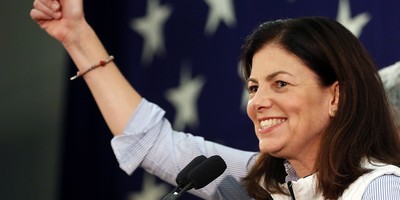Prince Otto von Bismarck is credited with the sneering remark that "there is a special providence that protects idiots, drunkards, children and the United States of America." Of course, that was in the age of presidents Rutherford B. Hayes, James Garfield and Chester A. Arthur, so Bismarck, the greatest statesman of his age, was entitled to look down on the quality of American leadership. One wonders what old "Blood and Iron" would say today if he were looking at the magnificent triumvirate of Hillary Clinton, Barack Obama and John McCain. (At least Curly, Moe and Larry were funny when they stuck their fingers into each other's eyes.)
Every several weeks, I write a column suggesting what this presidential election might look like if we had serious candidates and a press corps that treated the presidency as an important office in which vital decisions would be made by its incumbent. I invariably get flooded with e-mails telling me, basically, "Blankley, don't hold your breath."
Nonetheless, I shall persist -- but continue to breathe. Some serious questions should be posed to the candidates at a moment when the world shudders on its economic axis, with inflation showing its ugly head; oil at more than $115 a barrel; grain prices at historic highs; grain shortages leading to riots in Third World cities; the worst (still unresolved) financial crisis since the Great Depression; a dollar crisis; the prospect of an American recession that might pull the world's economies into its vortex; and a dangerous political trend away from healthy international trading practices.
Here are five questions for the three candidates. In several of these questions, the important -- if informal -- relationship between the president and the Federal Reserve Board chairman will be critical. They often have informal lunches during which coordinated monetary and fiscal policies are worked out. Some presidents don't avail themselves of that opportunity. First, will you actively seek to coordinate with the Fed chair?
Recommended
Second, how do you judge the inflation threat, and what will you do about it when you become president in less than nine months? While currently limited largely to commodities (including oil, food and basic industrial and construction materials), should monetary policy be used to try to drive down the prices of everything else at the cost of slow growth or even sustained recession? Or do you wait and hope that the commodities inflation doesn't taint the rest of the economy and create a virulent inflationary fire that will be even harder to put down? How will your assessment of the inflation danger affect your other policies (health care, infrastructure, etc.)? Will you subordinate various expensive programs if deficit spending to achieve them would exacerbate the inflation?
Third, are you for a strong dollar, or will you continue Bush's policy of letting the dollar sink? Some presidents think a weak dollar helps trade and we should do little to support the dollar. But today, for the first time in living memory, there is a risk that the dollar, if it continues to slide, would be replaced by the Euro as the global store of value. The United States benefits from the dollar's unique role in the world. It has permitted us to have influence in many ways, such as disrupting financial flows to adversaries such as Iran and North Korea. With international contracts denominated in dollars, we gain unfair advantage over all other currencies. Are you prepared to protect the dollar and drive its value up (again, working closely with the Fed chairman) or not?
Fourth, and flowing from the previous question, as noted by Benn Steil (director of international economics at the Council on Foreign Relations), to protect the dollar's value, we cannot let the Federal Reserve try to solve the financial crisis alone by flooding the market with dollars. If we are to strengthen the dollar, then we need the president and Congress to directly fund "on the books" the hundreds of billions of dollars the Fed is creating to help at-risk financial institutions. Of course, if you protect the dollar and fight inflation, you won't have money for new spending programs. Mr. and Ms. presidential candidates, please tell us now -- before we vote -- what your priority will be in this painfully difficult decision.
Fifth question: Notwithstanding the political usefulness of bad-mouthing NAFTA and the United States-Colombia Trade Promotion Agreement, are you committed to retaining and building the public consensus for a liberalized and globally integrated economy? Do you want America to give up on free trade or not -- keeping in mind that if America stops fighting for free trade, the world will go protectionist in a hurry. For all of its drawbacks, America is 10 percent richer each year as a result of our participation in world trade. If there is a 10 percent cut in our wealth each year, pretty soon we will be a much poorer people.
In future columns, I will look at the taxation and regulation policies of the three candidates. But it would be nice to get answers to these first five questions.

























Join the conversation as a VIP Member